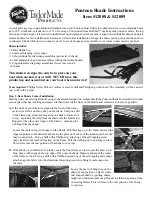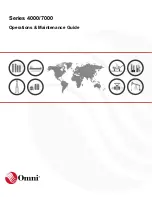
vetus®
Operation manual and installation instructions bow thrusters BOW6012D and BOW6024D
9 - 11 Nm
17
1
2
2 x M10
(6.5 - 8 ft.lbf)
22
020547.05
6
Electrical installation
Check that the voltage, recorded on the motor type plate, is in agree-
ment with the vessel’s circuit voltage.
6.1 Choice of battery
The total battery capacity must be sufficient for the size of the bow
thruste
See page
for the applicable battery capacity.
We recommend Vetus maintenance free marine batteries; these can
be supplied in the following sizes: 55 Ah, 70 Ah, 90 Ah, 108 Ah, 120
Ah, 143 Ah, 165 Ah, 200 Ah and 225 Ah.
We also recommend that each bow thruster is powered by its own
separate battery or batteries. This allows the battery bank to be
placed as close as possible to the bow thruster; the main power ca-
bles can then be short thus preventing voltage losses caused by long
cables.
n
ote
Be sure to only use ‘sealed’ batteries if the batteries are locat-
ed in the same compartment as the bow thruster.
The Vetus ‘SMF’ and ‘AGM’ maintenance-free batteries are ideally
suited to this application.
Batteries that are not ‘sealed’ may produce small amounts of ex-
plosive gas during the charging cycle.
Sparks generated by the carbon brushes of the bow thruster
motor may ignite this explosive gas.
Always use batteries whose type and capacity are compatible for
their use.
c
aution
In extreme cases, for example when a battery with a capacity of
five times or more than suggested is used, there is the danger
of causing permanent damage to one or more of the following
shaft connections:
- The connection between motor shaft and the tail piece input
shaft.
- The connection between the tail piece output shaft and the
propeller.
6.2 Main switch
The main switch must be fitted to the ‘posi-
tive cable’.
The Vetus battery switch type BATSW250 is
a suitable switch.
n
ote
Be careful not to rotate the
bolt and nut 1 while con-
necting the cables.
To prevent this happening,
keep an open-ended span-
ner on nut 1 while screwing
on bolt 2, without rotating
this spanner.
The torque for nut 2 is 9 - 11
Nm (6.5 - 8 ft.lbf).
6.3 Main power cables (battery cables)
The minimum diameter must be sufficient for the bow thruster’s cur-
rent draw in use and the voltage drop must not be more than 10% of
the voltage supplied, consult the table on page
n
ote
The maximum duration of engagement and the thrust, as
specified by the technical details in your bow thruster instal-
lation and operating manual, are based on the recommended
storage battery capacities and storage battery connection
cables.
If appreciably larger batteries in combination with very short
connection cables with appreciably larger diameter than
recommended are used then the thrust will increase. In such
cases the maximum operating time must be reduced in order
to prevent damage to the motor.
6.4 Connecting the main power cables
Make sure that no other electrical parts come loose when con-
necting the electric cables.
Check all electrical connections after 14 days. Electrical parts
(such as bolts and nuts) may come loose as a result of fluctua-
tions in temperature.
• Connect the main power supply cables.
Main switch with remote control
Instead of a storage battery main switch, a
remotely controlled main
switch annex emergency stop
can be installed.
This remotely controlled main switch is available for 12 or 24 Volt DC.
Vetus art. code: BPMAIN12 respectively BPMAIN24.
ENGLISH
















































